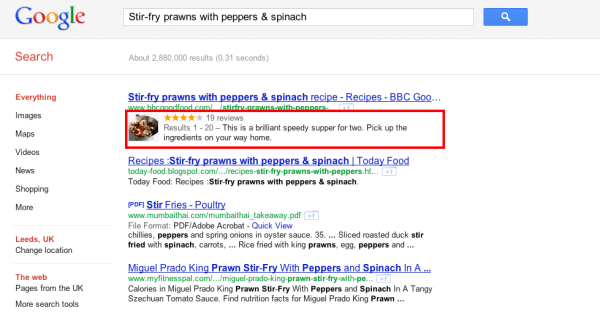
How BBC Worldwide grew traffic to the Good Food website 60% + in 12 months
I recently caught up with BBC Worldwide Digital Marketing Manager, Selina Holliday, to talk through what's involved with managing a popular online publication. I’d heard about their success across multiple BBC web properties including the Good Food website, so I wanted to quiz Selina to learn how she and the wider BBC Worldwide team managed to grow one of the sites in their portfolio as much as they did (BBC Good Food). Let’s recognise that this growth is quite an achievement for a website that already receives high volumes of traffic.
So what's the secret? My takeaway was "Keep it simple and focus limited resources on getting the basics right". Our discussion reminded me just how simple online marketing can and should be in terms of strategy. We know that digital marketing can be intricate and sometimes pretty complicated, perhaps because we make it so? I know I have been guilty of this in the past and no doubt will be again in the future. Here’s Selina’s recommendations which I've summarised as 5 simple steps.
1. Back to SEO basics
As part of their big push on the Good Food website Selina and the team went back to basics first, looking at:
- Page titles
- Internal link structure
- Page structure, specifically Headings (h1 & h2 etc)
- Meta Description tags
The most fundamental update to the website however was the implementation of the rich snippet markup, specifically the Recipe and Review tags. Coupled with the pointers above it was all about getting focus on the basics in place, something I would recommend is reviewed on a six monthly basis on our own sites and projects.

How the BBC Good Food Website appears in Search Results due to Rich Snippets
It is key you involve fresh eyes in the process, whether internal peers or external experts, it is all too easy to miss the obvious questions and simple issues if you are immersed in the business or website full time. Getting the core on-page elements in place should not be under-stated with regards to its potential impact on your rankings.
You can learn more about On-page optimisation and Rich snippets in our tutorials:
2. Educate the *whole* team
Publishing content is absolutely core to the BBC’s businesses - they’re pass-masters at it . If you are not publishing remarkable content that is specific to your customers and your business then it is going to be very difficult to grow online reach, unless you have big advertising budgets, though even then there’s no direct relationship between scaling spend and gaining relevant reach. This aside, the BBC team have a multiple people generating content, as well as editors and managers weaved into that process.
With so many people involved it was imperative that the whole team understood not only the goal, but the process in how things needed to work, so Selina introduced the IAB to deliver an SEO training course for the editorial team.
Having a team of copywriters and editors that completely understand the basics of on-page SEO and the opportunity that it brings is an immensely powerful concept. This also reduces the time and number people required as part of an editorial process. it’s empowering everybody. Time should be invested in making the content amazing and knowing every member of the team has considered SEO at every point. Makes sense over out-sourcing to an ‘SEO agency’ when you think about it?
A comment from Selina that has stuck with me sums this up:
“SEO has become a key consideration and a part of the culture rather than a specific role or skill set”
This is great to hear in my opinion, SEO is far from a dark art and having a team of people aligned to the techniques and all eyes on the same prize is far more powerful than having an “SEO expert” in the team, or worse sat outside of it looking inwards.
Does your marketing team understand the importance of content, the structure of that content in terms of the keywords, page titles, headers etc? If not I would suggest running a team training session is something you should consider as you move your business forwards. It doesn’t have to cost a lot either a local consultant or using an educated team member would help you get started.
3. Clear, simple & trackable KPIs
Selina and the team were able to discuss very specific KPI’s and actions related to them. This intrigued me as with such huge websites and volume of data I expected quite a complex suite of dashboards and reports. This however was not the case and I found it refreshingly simple. Selina and the team setup specific monthly targets based on business objectives. This can be as simple as traffic from natural search or page views per visit. Actions are then put in place to deliver the KPI’s, outside of some core metrics this is all the team focus on. Simples.
4. Keep analytics simple & share insights
Another simple process the BBC Worldwide take seriously is sharing key insights with the wider team, the team who’ve been trained and briefed to face the same way are kept informed. A prime example of this in action for the BBC Good Food website - the data shared is quite specific:
- Recent popular searches on the websites
- Popular pages / recipes viewed
- External search trends - including seasonal changes
This data is collated each week and shared with the editorial team so it can influence the content schedule and ensure the site is always relevant and producing the content people are searching for.
Do you empower your team with insights and data on a regular basis? From the notes above, you can see it doesn’t have to be complicated and will fuel and inspire the team and individuals within it.
5. Process is paramount
Probably the most important point is process design, and then sticking to it. The BBC Good Food website is a well oiled publishing and marketing machine, the process to allow this to happen are not complicated nor difficult to implement. The process used at the BBC Worldwide is very similar to the process we utilise in our agency on behalf of our clients as part of our Inbound Marketing Services. Here’s how I summarise this:
- Set clear objectives
- Set a top level strategy to give focus on hitting objectives (utilise a framework like Smart Insights’ RACE to do this)
- Outline KPI’s to hit (tie to commercial objectives as needed)
- Break out deliverables into manageable chunks, tie them to KPI’s or goals
- Allocate the resource to deliver the required work
- Monitor and measure
- Rinse and repeat the deliverables as required
This process is effective because it is part of the culture in the BBC Worldwide team - it helps keep everyone aligned, informed and focussed.
I cannot thank Selina enough for her time and insights, I hope you find them as refreshing and useful as I did.








